- Home
- Cecelia Ahern
Roar Page 7
Roar Read online
Page 7
She takes out a small tube of lotion from her leather handbag, squeezes out a little and massages her hands, slowly, calmly, while staring into space, lost in thought. The waitress watches her, she can’t take her eyes off her, there is something hypnotic about her slow, self-assured rhythmic movements. It is as though she has rehearsed them, in this exact order. The lotion disappears into her bag and a lip balm appears, which she rubs over her lips, still lost in a hypnotic gaze. The tube disappears into the bag and the waitress waits for what will come out next. A phone probably. Maybe a diary. There is a fat briefcase by her feet under the table, an expensive leather one with gold clasps at the locks and some wear and tear. It is used regularly, not just for special occasions, as if it is important and everything in it is too, just like the woman. Sarah can tell by the way the woman is guarding it with her legs, pushing it flat against the wall, making sure it doesn’t fall down and that nobody steals it. Legal documents probably, which would be in keeping with the black cloak worn in court by barristers that she removed when she entered and hung over the back of her chair. Barristers speak for a living, something that strikes Sarah as astonishing, because she has avoided speech, and public speaking in particular, for as long as she can remember.
Nineteen years old, Sarah has had a lisp all her life, a tongue that would never obey despite the speech therapy classes she was sent to. A tongue that insists on protruding and touching her front teeth, directing the air-flow forwards whenever she makes an ‘s’ sound, making a ‘th’ sound instead. This interdental or frontal lisp is supposed to be treatable, this functional speech disorder that it is now, as opposed to the sweet, funny and endearing habit she had as a young child. When those who were entertained by it began telling her to grow out of it, she knew it was time to fix the problem. But it didn’t go away, would not go away, and in school she was ridiculed constantly. Now, as an adult who recently started university and this part-time waitressing job, the ridicule is less overt – but the raised eyebrows are still there, the amused eyes, the guys she meets in clubs who lose interest when she speaks.
Her speech therapist said it was her mind, not her tongue that wouldn’t obey. One would almost think she wanted to speak like that. But she knew she didn’t. Ever since the lisp had stopped being cute, she had learned to only speak when it really mattered. It was astonishing to learn how much speech had not mattered to her. Instead she grew to be good at listening, and a keen observer.
Sarah examines the woman’s clothes. Black suit, tailored, expensive – just as the lotion and lip balm brand had been. She guesses the woman has come directly from court; sometimes lawyers make it as far as here for lunch and dinner, but mostly they opt for restaurants closer by. She can’t take her eyes off the woman and the way she holds herself. And there was that order of sparkling water with no ice, delivered with such confidence and no apology. Sarah has delivered almost every word from her own mouth with an apology since childhood. Even her name presents a challenge. Sometimes she gives a different name; depending on who’s asking, and on her confidence levels. Briana is her favourite alias; she delivers that name with the confidence of a young woman named Briana, and she’s often wondered how different life would be, not without a lisp, but with a name she could at least pronounce.
Finally, the customer folds the menu, pushing it closed with her manicured nails. Real nails, clear varnish, natural white tips.
‘Are you ready to order?’ Sarah asks, approaching the table, placing down the sparkling water, without ice and lemon. She notices the tone of her own voice, she sounds different. She wants to please this woman, she wants this woman to like her, she wants to be this woman’s friend. She has an authority Sarah wished she held. She admires that she is unapologetic when she speaks.
‘Yes, thank you,’ the woman replies pleasantly, looking up.
Sarah hears the lisp again, and her heart skips a beat. It wasn’t a joke and she hadn’t imagined it the first time.
‘Super,’ she says, rather breathless. A word she never would have used before now, she is surprised she said it herself.
The large table erupts in laughter, it takes over the space of the small bistro. They weren’t laughing at Sarah but she can’t help but feel that all laughter is directed at her.
The woman looks at the table of men, reopens the menu, appears to rethink her order and then, as though a decision has been made, she smiles.
‘Could you tell the chef that I’d like the seabass special, please, with a side of steamed spinach and celeriac salad.’
The waitress’s eyes fill up, goosebumps rise on her skin. She hates asking people if they wanted to know the special. She avoids that word every day, trying to figure out how else to point out the food on the blackboard in the bistro. And here: our meal of the day.
‘You’ll do that, won’t you?’ the woman asks. But she’s not asking, she’s telling her, supportively, encouragingly.
Sarah shifts uncomfortably from one foot to the other. ‘I’ll just write it down here.’
‘You should tell him.’
The chef has a temper. He’s one to be avoided – that was the first thing she was told when she took this job. He isn’t patient, with her or with others, especially not her. There used to be a waiter who had a stammer but he couldn’t take the goading, so he left the job, went somewhere speaking wasn’t imperative. Nobody in this bistro has time to listen, and it’s a trait echoed in the real world. Sarah has been interrupted often by those eager to finish her sentences for her, sometimes to make it easier for her, but often because they’ve no patience with someone who needed to take their time. She’s accustomed to backs being turned on her mid-conversation, or eyes watching her mouth as she speaks. Speech impediments bother people. And sometimes one comment can be enough to shut a person up for ever.
‘You can do it,’ the woman says.
Sarah nods, takes a deep breath, and walks purposefully to the kitchen with the order in her hand.
The chef isn’t shouting, he has his head down, sweating, putting finishing touches to the table of seven’s main course dishes.
‘Good timing,’ he says, sprinkling salt over the last sole on the bone and giving her the nod.
She must have a funny look on her face.
‘What’s wrong?’ he asks.
‘I’d like to tell you my next order.’
He frowns. Not enough time for this crap.
‘The woman at table four would like …’ Sarah looks down to read the order in her lightly trembling hand, but she knows it by heart and so looks up again and lifts her chin. ‘She would like the seabass special, with a side of steamed spinach and celeriac salad.’
He studies her for a beat. She places the order on the pass, and he looks up at it, reads it as if to confirm. She stands and waits. She’s not sure what she’s waiting for but it was a groundbreaking moment in her life. What comes after groundbreaking moments?
Normality apparently.
‘Grand,’ he nods, finally. ‘Take these out before they get cold,’ he says then, and rings the bell on the counter.
She smiles, lifts the plates and strides out to the restaurant, cheeks flushed, head high, feeling exhilarated as though she has taken her first skydive, soaring from dizzy heights.
‘Now tell me,’ the woman says to Sarah when she returns to her table with her seabass special. ‘What do you recommend for dessert?’
Sarah readies herself. ‘I would personally recommend the sweet strawberry posset with raspberry sorbet.’
The lone woman claps her hands together gleefully.
The woman eats slowly, thoughtfully, rhythmic and methodical. Then she slips on her shoes and her black court cloak, and pays, leaving a generous tip.
Sarah floats through her duties for the rest of the day. Something has been unlocked, as though some secret code was transferred from one woman to the next, a magic code that taught her to accept herself and to be unapologetic for the way that she is, to speak when she want
s to speak, never to hold back on her words for fear of how people will treat her.
All because of the woman with a lisp who ordered the Seabass Special with Steamed Spinach on the Side, a Sparkling water with no ice, and for seconds a Sweet Strawberry posset with raspberry Sorbet.
She had been searching for a baby photograph for her son’s school project and as soon as she’d opened the first page of the photo album, she was lost in the memories, sucked into a time warp and unable to escape. It was one particular photo that did it. Scott at four months old, his cheeks so enormous he could store food in them for a year, his roly-poly legs up in the air mid-kick, alight with raucous laughter. His eyes on her. Always following her as she moved around like she was the most important thing in his world. She wanted to nibble those cheeks, those legs, kiss him over and over and inhale his sweet baby-powdery smell.
Before she knew what she was doing, the photo was out of the sleeve and in her mouth and she was chewing. She stopped chewing, her eyes widening at the realization of what she was doing. But then in an instant, a tidal wave of emotions, smells and memory enveloped her, wrapping her up in a warm, cosy cocoon of love and nostalgia. She closed her eyes and swallowed.
Her head swirled, she felt like she was on a high. She sat back on the couch and felt that bouncing baby boy in her arms, felt his fingers pull at her lips, claw at her hair, rock back so suddenly that she had to wrap him tighter, support his neck. She smelled his breath so close to her face as he nuzzled her. That smell, the feel of his soft skin, the sounds from his developing voicebox. She felt the fabric of their old velvet couch beneath her legs, the same familiar concerns in her mind, ones she hadn’t even thought about for so long. For fifteen minutes she sat alone, caught in her past life. Then suddenly, just like that, it was gone. He was gone from her.
Her eyes pop open, her heart pounding wildly. Immediately she looks to the photo album, licking her lips greedily, trembling fingers hovering excitedly over the photographs as though staring hungrily into a box of chocolates. She chooses her next delicacy carefully. Scott, four days old, just home from hospital. She grabs it, keeps her eye on the door as she pushes it into her mouth, unable to do it fast enough. Chewing photograph paper is difficult. It takes a lot to break down, her jaw aches, the taste makes her retch, but when she reaches the other side, the smells, the sounds, the sights flash into her mind, while the ache in her jaw and the bad taste fade away.
His newborn baby screams. More milk, he never could have enough milk. She’s back to midnight and three a.m. feeds, tiredness not yet hitting her as she’s still on her two-week high. Feelings of utter joy, of purpose, of longing.
‘Mum,’ a voice interrupts her. ‘Are you okay?’
Her eyes open. She sees Scott, now fifteen, standing at the door. He is disgusted by most things these days, including her, but now there’s concern in his eyes. She must look a state.
‘Yes, I’m fine …’ She sits up and realizes there’s a film of sweat on her forehead. She’s sticky under her arms. ‘I was just looking for that baby photo you asked for.’
His face softens and he enters the room. He sits down beside her but when he reaches for the album, she instinctively clings to it tighter. He looks at her, and tugs at the album. Realizing her idiocy and taken aback by her possessiveness, she finally relents. Her stomach grumbles and her heart pounds as he flicks the pages; she needs more. She needs the hit of nostalgia, the fix that transportation to another place gives her.
‘Where are the newborn photos?’ he asks, looking at the empty first few pages of the album.
She stifles a burp.
Later that night when everybody is asleep, she sits up, wide awake, feeling an overwhelming longing. She watches her husband, remembering how he was when they met, before the years altered him. She throws off the bedclothes and retreats to the darkened living room with the photo album in her hands. She flicks excitedly to the summer they first met.
Lots of passion, thrilling sex, spine-tingling secret looks and gentle touches. She relives it all, eating one photo after another, and then lies back on the couch to feel everything from the past; the sensuality, the tingle of excitement, the uncertainty, the hope for the future.
Her mother and father. No longer alive. She runs her finger down their faces before lovingly devouring them, reliving every childhood moment with them; birthday parties and holidays, Christmas mornings and first day of school. Days later and she has worked her way through her childhood – stopping when she reaches her teenage years. Too complicated. She doesn’t wish to revisit those years. She moves on. The need for more photographs grows, it is constant, and while the feeling of being lost in nostalgia is wonderful, the actual eating of the photographs is a difficult task.
Over time she becomes clever.
She drizzles the photos with olive oil, seasons with salt and pepper and places them on a baking tray in the oven. When they’re brittle, she pops them in a blender and sprinkles them over her dinner. While the family sits around the table, she gets lost in her own world, secretly but still in their company, no cause for hiding at night any more. It is exciting because she doesn’t know which memory she’ll get lost in, she didn’t label the sprinkles and so the feelings that hit her, the years and moments she relives, are unexpected. She becomes drawn to the feeling of surprise as well as the high of the actual memory.
She finds new ways to consume her memories; mixing the blended photos with tea-leaves, allowing them to infuse with the boiling water. It takes time to ensure that the memories aren’t diluted, but she gets there, she wants them to be as strong as the moment she lived them. She leaves the tea to steep overnight, she grows accustomed to drinking it cold. She keeps packets of the ground paper in small plastic bags, to carry around with her wherever she goes. It helps her when she’s out with her family, for hours on end without access to her albums; she can add the sachets to boiling hot water when the cravings begin. And the cravings are intense. They come in the form of aches behind the eyes, stomach cramps, a trembling from inside as though caused by extreme hunger. What began as a once-a-day habit has grown now that the drinking enables her to indulge in more regular highs.
She feels her husband’s concern but she pretends that she doesn’t. She realizes she has been distracted lately. She has avoided friends’ company, choosing instead to stay home and retreat to her nostalgia. She doesn’t plan for it to be a permanent thing, it is just for now, to help her through the day. There have been so many changes. The children are teenagers, they don’t need her so much, not in the way they used to. Of course her relationship with her husband has changed, it was bound to over twenty-five years. She is noticing these changes and she supposes she is going through a time of transition, one that requires reflection. Thinking about how things used to be, that warm cosy feeling of being wanted, needed, really yearned for makes her feel safer.
It is the face of her husband that startles her when she returns home one day after a few hours out. She had forgotten her sachet of blended photos that she carried around as seasoning and so couldn’t sprinkle it over her salad at lunch as she usually would. Instead of bliss, the salad tasted cold. The tea she drank did nothing for her, the entire lunch was a boring experience, sitting in the café, trapped in the present with nothing to entertain her mind. She returned home feeling like a drug addict who needed a fix, to find her husband sitting at the kitchen table with the empty photo albums before him.
‘Where are the photographs?’ he asks. No anger in his tone, but perhaps fear.
She makes her way to the kettle, she needs something to settle her for this, perhaps the nice honeymoon photograph of them on the beach that she’d been saving, the one taken in a moment when she felt he could protect her from everything.
‘No,’ he reaches out and gently stops her from emptying the sachet into her mug. ‘Not that stuff now. I don’t know what it is, but it makes you far away. Talk to me.’
She sits down beside him, feeling the f
ight go out of her.
‘What have you been doing with the photographs?’ he asks again. ‘I see you with these books all of the time.’ He flicks through the pages. ‘All of our memories, they’re gone. What did you do to them?’ His eyes fill.
‘I ate them,’ she says quietly, and he looks at her in surprise. ‘It’s true. I ate them all.’
‘I was afraid you’d thrown them out, that you’d burned them,’ he says. ‘But to hear this I’m relieved, even though it’s …’
‘Weird. I know,’ she says. ‘It first started when Scott needed a baby photo for school. I took down the photo albums from the attic – why did we store them there, where we can’t see them?’ she asks and he shakes his head, unsure. ‘And I came across the one of him during his first Christmas.’
Her husband laughs, remembering. ‘His Christmas pudding costume.’
‘Do you remember?’ she lights up. ‘He was such a little pudding. Rolls on his legs, his arms.’
‘That boy wouldn’t stop feeding, I thought he’d drink you dry until you disappeared completely,’ he remembers and they laugh.
‘He just looked so delicious, and I remember that time in our life,’ she looks at him, eyes filling. ‘It’s not so long ago but it’s forever ago. And it’s gone. And it’s never coming back. I couldn’t help myself.’ She wipes her nose with a tissue. ‘Things have moved on too much, things keep changing … when I eat them, I’m back there again, being back there, where I know what’s happening and going to happen, feels safer than here. I miss those moments.’
‘We’re still making moments,’ he says gently. ‘And the past isn’t gone. We lived those moments, they are already part of us; we’re made of them.’
Something new to digest.
‘But we still have new moments to make, I think you’ve forgotten that. We’re all here, with you, making moments every day, and lately we’ve lost you. I know the kids feel it too. Here, look at this.’

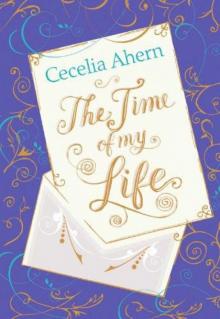 The Time of My Life
The Time of My Life Lyrebird
Lyrebird Girl in the Mirror
Girl in the Mirror Perfect
Perfect One Hundred Names
One Hundred Names PS, I Love You
PS, I Love You Flawed
Flawed The Book of Tomorrow
The Book of Tomorrow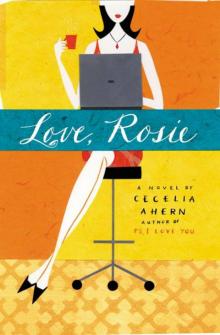 Love, Rosie
Love, Rosie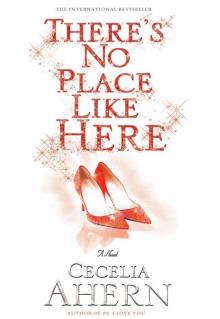 A Place Called Here
A Place Called Here How to Fall in Love
How to Fall in Love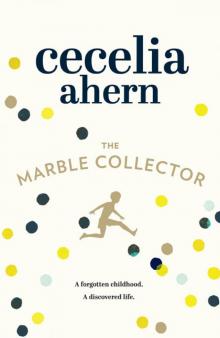 The Marble Collector
The Marble Collector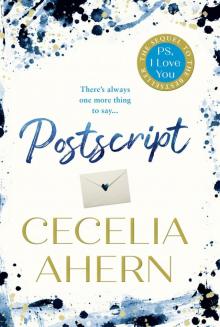 Postscript
Postscript The Gift
The Gift Thanks for the Memories
Thanks for the Memories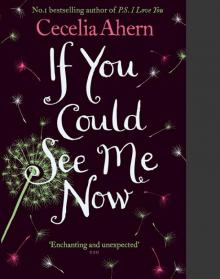 If You Could See Me Now
If You Could See Me Now Roar
Roar Cecelia Ahern 2-book Bundle
Cecelia Ahern 2-book Bundle Girl in the Mirror: Two Stories
Girl in the Mirror: Two Stories PS, I Love You: A Novel
PS, I Love You: A Novel Cecelia Ahern Short Stories
Cecelia Ahern Short Stories There’s No Place Like Here
There’s No Place Like Here